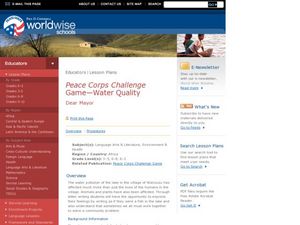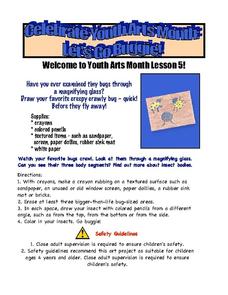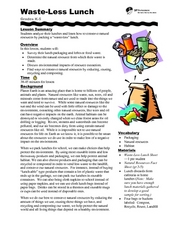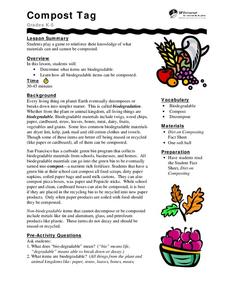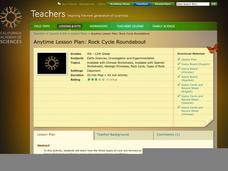Curated OER
Stream Scanners
Students investigate quality of water in a stream, lake, or pond by examining chemical, physical, and biological characteristics.
Curated OER
Wetlands Are Wonderful
Students study the characteristics of wetlands. They are introduced to terms and different examples of wetlands. The hands-on activity reinforces the different parts of the wetlands, and provides a working model of a wetland.
Curated OER
Wetland Metaphors
Learners describe the characteristics of wetlands and identify their ecological functions. They inspect items and use them to create metaphors about wetlands.
Curated OER
Sound Busters
Fourth graders engage in a study of sound pollution at their school. After a class discussion on what noise pollution is, learners are asked if they think there are areas of their school or community where noise pollution is a problem....
Curated OER
Environment: Clouds of Changing Times
Here is a wonderful lesson plan which has youngsters interview family and local elders about the seasonal history of their local area. They focus on climate change by asking questions about rainfall, temperatures, length of the seasons,...
Curated OER
Earthquakes and Volcanoes
Even though volcanoes look alike, they can be very different based on the types of lava that erupts from their surface. Learn about strata volcanoes, shield volcanoes, and the varying viscosity of lava with an engaging hands-on...
Curated OER
Disasters (Natural & Man-made)
Students chose a natural or man-made disaster, such as a tornado or an oil spill, to research using the assigned web sites. They choose a presentation type from a list which includes poetry, radio broadcasts, and safety brochures, to...
Curated OER
Barrels and Buckets: Access to Water - What Would It Be Like to Live in Africa?
Students compare water access in the United States with that of Africa. In this water access lesson, students located Ghana and Kenya on a globe before reading Peace Corps Volunteer accounts of the difficulty of accessing clean water....
Curated OER
Peace Corps Challenge Game- Water Quality
Students advocate for clean water. In this water pollution lesson, students play the Peace Corps Challenge Game, discuss the effects of polluted water and write a letter to the mayor of Wanzuzu highlighting the situation of the...
Curated OER
Bursting Blooms- Create an Early Spring
Young scholars prune a tree. In this gardening lesson, students select a shrub or tree that has a lot of flower buds and use sharp pruners to cut sections of branches. Young scholars place the cuttings into cool water and...
Curated OER
Design a Colonial Garden
Students explore botany by completing an art design activity in class. In this gardening history instructional activity, students identify the plants and crops utilized in the Colonial era for both food and medicine. Students utilize...
Illinois Department of Natural Resources
Section Four: How Can We Protect Biodiversity?
Look into the future with a lesson plan on biodiversity and natural habitats. Learners read articles about different perspectives when it comes to planning future development, and decide which angle is the highest priority in a...
University of Wisconsin
Identifying Your Soil for Rain Gardens
Teach your class the descriptive characteristics of soil. Provide information about particle size and a flow chart for assessing texture. Soil scientists then analyze samples and hypothesize which would be the best type for a rain...
Arts & Humanities
Let's Go Buggie!
To celebrate art youth month, little ones get out the magnifying glasses and get close-up with bugs. They make scientific observations of bugs you bring into the classroom. Then, they use markers, clay, paint, or crayons to make artistic...
University of Wisconsin
Follow the Drop
Young surveyors look for patterns in water flow around campus. Using a map of the school (that you will need to create), they mark the direction of the path of water. They also perform calculations for the volume that becomes runoff. The...
Wilderness Classroom
Pollution
Educate scholars on pollution—air, water, and land—with a series of lessons that begin with a thorough explanation of each type. Learners then take part in three activities to reinforce the importance of reducing pollution. They...
SF Environment
Waste-Less Lunch
Is it possible to have a waste-less lunch? Can your class become leaders in conservation? Discuss the importance of reducing waste during lunch time with a fun lesson that can be extended to everyday practices. First the class examines...
World Wildlife Fund
Bar Charts & Pie Charts
Learn about life in the Arctic while practicing how to graph and interpret data with this interdisciplinary lesson. Starting with a whole group data-gathering exercise, students are then given a worksheet on which they analyze and create...
SF Environment
Compost Tag
Composting is a great way to get children involved in recycling. First, they discuss how biodegradable products decompose to make compost. Then, they talk about what can and cannot be composted. They play a game similar to around the...
California Academy of Science
Rock Cycle Roundabout
After a basic introduction to the rock cycle and the three main types of rocks, young geologists can deepen their understanding of how rocks change through a fun learning game. Based on the characteristics and events shared by a reader,...
California Academy of Science
Natural Resources Bingo
Bingo isn't just a silly game, it's a great way to practice all types of skills. After reviewing that the earth is composed of natural resources, what those natural resources are, and sustainability, the class plays a game of bingo. The...
Curated OER
Earth's Water
If the majority of our planet is covered with water, why do we need to bother conserving it? With a thorough and varied investigation into the location and types of water on the earth, learners will gain an understanding of why this...
Curated OER
Tropical Forest Food Chain
Learners explore the interdependence of the animals and plants in tropical rainforests. They explore the importance of conserving biodiversity and tropical food chains. They create a tropical forest food chain and identify species that...
Curated OER
Exploring Ecosystems
Students examine the relationships between plants, animals, and the environment in ecosystems. They sort animal cards, collect natural materials from the schoolyard, and record an ecosystem web in the form of a poster.
Other popular searches
- 4th Grade Life Science
- Life Science Inquiry
- Life Science Vertebrates
- Life Science Experiments
- K 2 Life Science
- Life Science on Cells
- Life Science Lesson Plans
- Grade 4 Life Science
- Life Science Report Topic
- Australia Life Science
- The Life Science
- Life Science Lessons








